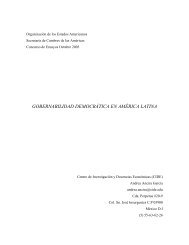The Road to Hemispheric Cooperation: Beyond the Cartagena
The Road to Hemispheric Cooperation: Beyond the Cartagena
The Road to Hemispheric Cooperation: Beyond the Cartagena
You also want an ePaper? Increase the reach of your titles
YUMPU automatically turns print PDFs into web optimized ePapers that Google loves.
my and, most of all, <strong>the</strong> government’s need <strong>to</strong> preserve <strong>the</strong><br />
internal order, make it very difficult <strong>to</strong> carry out <strong>the</strong> necessary<br />
and long-overdue reforms.<br />
Latin America’s democratic consolidation sorely requires<br />
<strong>the</strong> modernization of police forces and an increase in <strong>the</strong><br />
state’s capacity <strong>to</strong> enforce <strong>the</strong> rule of law. Given <strong>the</strong> sensitivity<br />
of <strong>the</strong> issues and interests involved, <strong>the</strong>se efforts<br />
can only succeed with strong and sustained support at<br />
<strong>the</strong> highest political level. <strong>The</strong> failure of police reform processes<br />
will very likely enhance <strong>the</strong> trend <strong>to</strong>ward <strong>the</strong> militarization<br />
of public security already visible in several Latin<br />
American countries.<br />
Indeed, decisions made in <strong>the</strong> wake of Latin America’s<br />
democratic transitions <strong>to</strong> keep <strong>the</strong> armed forces away from<br />
domestic pursuits are being revisited at <strong>the</strong> moment. <strong>The</strong><br />
call for military participation in internal security in several<br />
countries implies that police forces are unable <strong>to</strong> deal with<br />
crime, but that <strong>the</strong> military may be capable of doing so. <strong>The</strong><br />
latter may prove a dangerous mirage. Untrained <strong>to</strong> control<br />
crime, <strong>the</strong> military’s involvement in domestic security may<br />
well bring a myriad of troubling consequences, including<br />
widespread human right abuses and <strong>the</strong> corruption of <strong>the</strong><br />
armed forces.<br />
<strong>The</strong> state of judicial institutions in Latin America is only<br />
slightly better. As mentioned above, most Latin Americans<br />
perceive <strong>the</strong> justice system as slow, corrupt, inefficient,<br />
and biased against <strong>the</strong> poor. Courts are seen as “revolving<br />
doors” with limited capacity <strong>to</strong> prosecute and convict those<br />
who commit crimes.<br />
Over <strong>the</strong> past decade, most Latin American countries<br />
have introduced changes <strong>to</strong> <strong>the</strong>ir criminal justice systems,<br />
mostly geared <strong>to</strong>ward <strong>the</strong> <strong>to</strong>tal or partial replacement of<br />
<strong>the</strong> traditional inquisi<strong>to</strong>rial procedures with an adversarial<br />
or mixed system. <strong>The</strong> goal has been <strong>to</strong> streng<strong>the</strong>n due process<br />
and rights of <strong>the</strong> accused and also <strong>to</strong> better guarantee<br />
citizen security by streng<strong>the</strong>ning criminal investigation<br />
processes and obtaining effective, timely and legitimate<br />
evidence for convictions. It is <strong>to</strong>o early <strong>to</strong> know whe<strong>the</strong>r<br />
<strong>the</strong>se reform processes—which imply new and different<br />
roles for judges, prosecu<strong>to</strong>rs and police officers—have<br />
significantly improved public security. Significant problems<br />
have arisen in <strong>the</strong> implementation of reforms, usually con-<br />
nected <strong>to</strong> police unwillingness <strong>to</strong> submit <strong>the</strong>mselves <strong>to</strong><br />
oversight by <strong>the</strong> Public Prosecu<strong>to</strong>r’s Office in <strong>the</strong> investigation<br />
process.<br />
Moreover, in many countries, public opinion is yet <strong>to</strong> warm<br />
<strong>to</strong> <strong>the</strong> changes. In <strong>the</strong> view of many experts and <strong>the</strong> public—notably<br />
in countries heavily affected by organized<br />
crime—<strong>the</strong> reforms tend <strong>to</strong> increase <strong>the</strong> protection of <strong>the</strong><br />
rights enjoyed by presumed offenders and thus multiply<br />
<strong>the</strong> opportunities for criminals <strong>to</strong> avoid punishment. 48 It is<br />
important <strong>to</strong> note, however, that in countries where <strong>the</strong>se<br />
reforms have been fully implemented <strong>the</strong> efficiency of <strong>the</strong><br />
justice system has substantially increased and <strong>the</strong> duration<br />
of criminal proceedings has been reduced. 49<br />
<strong>The</strong> weakness of police forces and courts—which are<br />
made worse by a near-breakdown in correctional systems<br />
throughout <strong>the</strong> region—is one of <strong>the</strong> key fac<strong>to</strong>rs that underlie<br />
LAC’s violence epidemic. 50 When <strong>the</strong>se deep institutional<br />
flaws are placed alongside a set of social conditions and<br />
transformations that are inimical <strong>to</strong> social peace, <strong>the</strong> picture<br />
that emerges is a daunting one. Enhancing public security<br />
levels in LAC calls for a comprehensive policy approach<br />
that is none<strong>the</strong>less attuned <strong>to</strong> <strong>the</strong> nuances of local contexts.<br />
Above all, policymakers ought <strong>to</strong> resist <strong>the</strong> temptation <strong>to</strong><br />
seek single causes and remedies <strong>to</strong> <strong>the</strong> region’s violence.<br />
<strong>The</strong> pending task is far more complicated than simply looking<br />
for a silver bullet.<br />
<strong>The</strong> Challenges<br />
<strong>The</strong> public security agenda in <strong>the</strong> Americas is broad and<br />
multidimensional. Crucially, effective reforms require a nuanced<br />
approach that recognizes <strong>the</strong> substantial differences<br />
in <strong>the</strong> nature of public safety problems within <strong>the</strong> region.<br />
Hence, for instance, in Mexico, <strong>the</strong> so-called nor<strong>the</strong>rn triangle<br />
of Central America (Guatemala, Honduras and El<br />
Salvador), and some countries in <strong>the</strong> Caribbean, such<br />
an agenda can hardly be decoupled from <strong>the</strong> challenges<br />
posed by drug trafficking and proximity <strong>to</strong> <strong>the</strong> highly profitable<br />
U.S. narcotics market. A different kind of organized<br />
crime-related challenge afflicts Brazil, particularly its main<br />
cities. <strong>The</strong>re, violence problems are also connected <strong>to</strong><br />
<strong>the</strong> presence of heavily armed criminal organizations with<br />
terri<strong>to</strong>rial control, and widespread gun ownership. Yet in<br />
<strong>the</strong> Brazilian case, problems go beyond drug trafficking<br />
<strong>The</strong> <strong>Road</strong> <strong>to</strong> <strong>Hemispheric</strong> <strong>Cooperation</strong>: <strong>Beyond</strong> <strong>the</strong> <strong>Cartagena</strong> Summit of <strong>the</strong> Americas<br />
<strong>The</strong> Brookings Institution ❘ Latin America Initiative<br />
68








